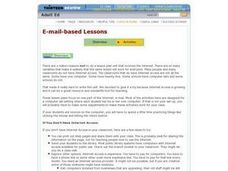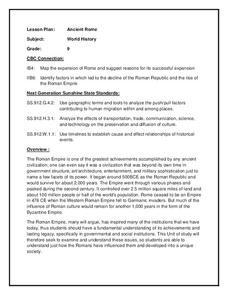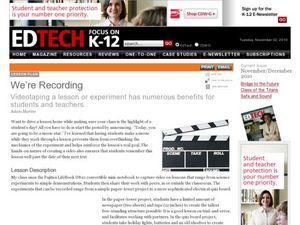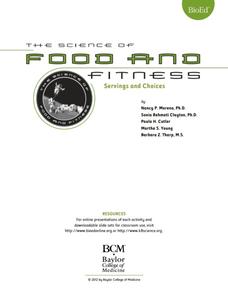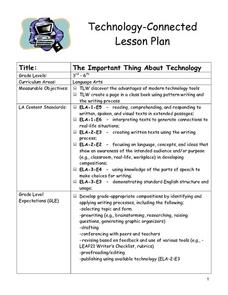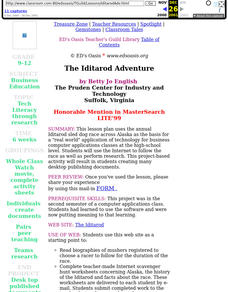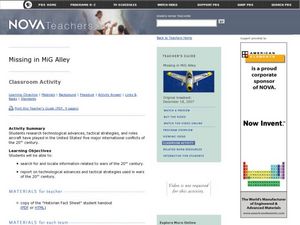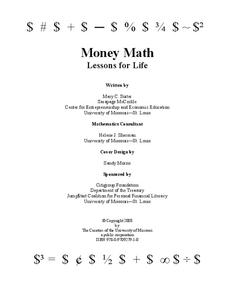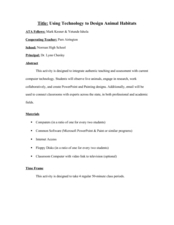Curated OER
Evaluating Information Resources
Students identify at least five aspects to be examined in determining the validity of information presented on a website. They classify websites into highly trustable, trustable or questionable information sources. In addition, they...
Curated OER
Exploring Technology in Careers
Students discover how technology is used in the workplace. In this careers lesson, students compare and contrast careers and how technology is incorporated into each of them. Students set goals to achieve their ideal career.
Curated OER
A Good Foundation
Students examine how regional geology affects bridge foundations. In this physical science lesson, students explore how bridge types are constructed for different purposes.
Curated OER
Haiku Movies
Pupils create a movie to illustrate an original haiku poem in this upper-elementary school, Language Arts lesson utilizing technology. The lesson meets state standards for Language Arts and includes a materials list and possible lesson...
Curated OER
Technology and the Great Depression
Students examine how technology affected the Great Depression era. They view a video, conduct Internet research, and write articles for a class technology magazine.
Curated OER
E-mail-based Lessons
Students practice using computers. They use the Internet to practice surfing the web and finding information. They also practice writing emails and journal entries.
Miama-Dade County Public Schools
Ancient Rome
This resource outlines several general activities for a study of Ancient Rome, and includes guiding questions, a handout on the story of Romulus and Remus, and ideas for incorporating mapping and timeline activities into your review.
Curated OER
We're Recording
Students record their experiments or lessons using a video camera. In this technology lesson plan, students explain to the camera what they have learned. They watch these together to help reinforce a lesson plan.
Baylor College
Servings and Choices
An important part of balancing caloric intake to energy expenditure is knowing how many Calories you are consuming. In the fifth of a seven-lesson series on food and energy, learners estimate their daily caloric intake, then use a...
Curated OER
Fix It
Word processing practice and vocabulary blend with proofreading in a multi-purpose lesson that makes excellent use of an hour in the computer lab. Learners edit the grammatical, spelling, and punctuation errors in a given paragraph (not...
Curated OER
Designing a 2-liter Pop Bottle Piece to be Used for Water Rockets
High schoolers design and create water rockets using recycled materials. In this technology activity, students measure and sketch their project design before drawing them using SolidWorks. They construct the bottle as accurately as...
Curated OER
Feeling Good About My Body: A Lesson on Self Esteem
Third graders explore the concept of self esteem. In this health lesson plan, 3rd graders participate in several classroom activities that address developing a positive self concept.
Curated OER
The Introduction and Diffusion of Household Technology
Learners conduct research and develop a matrix demonstrating the introduction and spread of common household items from 1900 to 2000 in the U.S. They conduct Internet research, watch and discuss a video, and develop the matrix.
Curated OER
The Important Thing About Technology
Students assess the advantages of modern technology tools by creating a page in a class book utilizing pattern writing as well as the writing process. They organize and develop a composition on a selected topic after going through the...
Curated OER
The Iditarod Adventure
Students use the internet to follow the Alaskan Iditarod race as well as perform research. This project-based activity will result in students creating many desktop publishing documents.
Curated OER
Missing in MiG Alley
Students consider how technology impacted American conflicts. In this technological advances lesson, students read, "The Changing Face of War," and then describe how technology made differences in World War I, World War II, the Korean...
Curated OER
I Feel Renewed!
Students participate in a simulation of the equal and unequal distribution of the earth's renewable resources. They discuss renewable resources and how food resources can increase and decrease, participate in the simulation, and analyze...
Curated OER
Is That Natural?
Students examine how they use and waste natural resources. They participate in a class discussion about natural resources, in small groups complete a worksheet identifying ways students misuse natural resources, and create an...
Curated OER
Money Math: Lessons for Life
Students develop a budget for a college student using all of the influences that the student would have. In this budgeting lesson plan, students use real life examples to create a budget spreadsheet. Students read and study sample...
Curated OER
Using Technology to Design Animal Habitats
Young scholars study the relationship between an animal and where it lives. In this habitats activity students research to obtain data and create a professional report.
Curated OER
TE Lesson: How Clean is that Water?
Students examine the factors the affect water quality, and allow for animals and plants to live. They look at how engineers apply water quality information when making stream modifications in order to ensure drinking water quality. They...
Curated OER
A Differentiated Way through Think Dots
Learners examine reasons that led people to explore, identify "West" as defined following Revolutionary War, explain importance of finding natural resources, develop time line of dates and events leading up to Lewis and Clark Expedition,...
Curated OER
Land of Milk and Honey Relocated or Not (Lesson 3)
Fourth graders practice their research skills. In this North Carolina history instructional activity, 4th graders examine primary resources and draw conclusions regarding the birth of the city of New Bern, North Carolina.
Curated OER
Design a Recycling Game!
Students discover that recycling is using a product more than once so that natural resources can be saved and so that we won't need so many garbage dumps and landfills. They see that there are different ways to recycle. Students design a...







